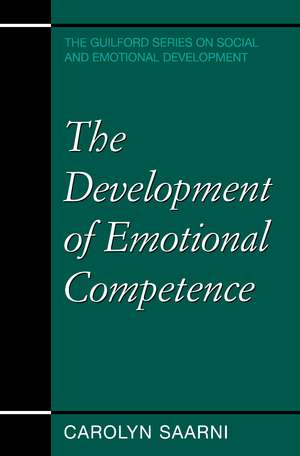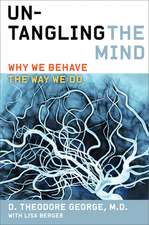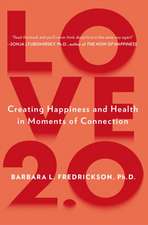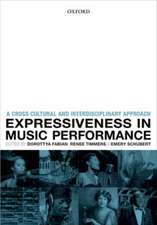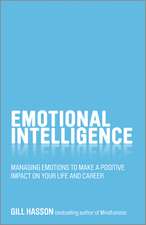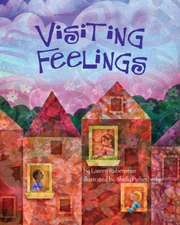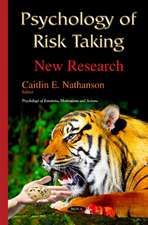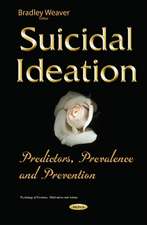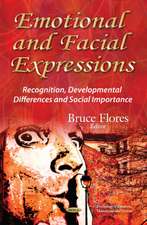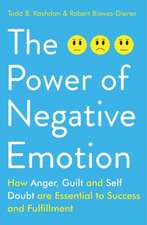The Development of Emotional Competence: Guilford Series on Social and Emotional Development
Autor Carolyn Saarnien Limba Engleză Paperback – 29 apr 1999
Synthesizing the latest research and theory with compelling narratives and case vignettes, this book explores the development of emotional competence in school-age children and young adolescents. Saarni examines the formation of eight key emotional skills in relation to processes of self-understanding, socialization, and cognitive growth. The cultural and gender context of emotional experience is emphasized, and the role of moral disposition and other individual differences is considered. Tracing the connections between emotional competence, interpersonal relationships, and resilience in the face of stress, the book also explores why and what happens when development is delayed.
Preț: 362.94 lei
Preț vechi: 382.04 lei
-5% Nou
Puncte Express: 544
Preț estimativ în valută:
69.45€ • 72.70$ • 57.46£
69.45€ • 72.70$ • 57.46£
Carte tipărită la comandă
Livrare economică 07-21 aprilie
Preluare comenzi: 021 569.72.76
Specificații
ISBN-13: 9781572304345
ISBN-10: 1572304340
Pagini: 381
Dimensiuni: 152 x 229 x 25 mm
Greutate: 0.62 kg
Ediția:New.
Editura: Guilford Publications
Colecția Guilford Press
Seria Guilford Series on Social and Emotional Development
ISBN-10: 1572304340
Pagini: 381
Dimensiuni: 152 x 229 x 25 mm
Greutate: 0.62 kg
Ediția:New.
Editura: Guilford Publications
Colecția Guilford Press
Seria Guilford Series on Social and Emotional Development
Public țintă
General, Professional, and Professional Practice & DevelopmentCuprins
Prologue: What Is Emotional Competence?
1. The Inseparability of Emotional and Social Development
2. The Role of the Self in Emotional Competence
3. How We Become Emotionally Competent
4. Skill 1: Awareness of One's Own Emotions
5. Skill 2: The Ability to Discern and Understand Others' Emotions
6. Skill 3: The Ability to Use the Vocabulary of Emotion and Expression
7. Skill 4: Capacity for Empathic Involvement
8. Skill 5: The Ability to Differentiate Internal Subjective Emotional Experience from External Emotional Expression
9. Skill 6: Capacity for Adaptive Coping with Aversive Emotions and Distressing Circumstances
10. Skill 7: Awareness of Emotional Communication within Relationships
11. Skill 8: Capacity for Emotional Self-Efficacy
12. Emotional Incompetence and Dysfunction
1. The Inseparability of Emotional and Social Development
2. The Role of the Self in Emotional Competence
3. How We Become Emotionally Competent
4. Skill 1: Awareness of One's Own Emotions
5. Skill 2: The Ability to Discern and Understand Others' Emotions
6. Skill 3: The Ability to Use the Vocabulary of Emotion and Expression
7. Skill 4: Capacity for Empathic Involvement
8. Skill 5: The Ability to Differentiate Internal Subjective Emotional Experience from External Emotional Expression
9. Skill 6: Capacity for Adaptive Coping with Aversive Emotions and Distressing Circumstances
10. Skill 7: Awareness of Emotional Communication within Relationships
11. Skill 8: Capacity for Emotional Self-Efficacy
12. Emotional Incompetence and Dysfunction
Notă biografică
Carolyn Saarni received her PhD from the University of California at Berkeley, specializing in developmental psychology. She began her academic career at New York University, but after a number of years returned to the West Coast. Since 1980, she has been on the faculty of the Department of Counseling at Sonoma State University in California, where she trains prospective marriage, family, child, and school counselors. Professor Saarni's research has focused on how children learn that they can adopt an emotional front, that is, what they express emotionally need not match what they really feel. She has also investigated how children use this knowledge strategically in their interpersonal relations with others as well as when coping with aversive feelings. Her research has been funded by the National Science Foundation and the Spencer Foundation, among others. In addition to Lying and Deception in Everyday Life (with Dr. Michael Lewis), Dr. Saarni's other edited volumes include The Socialization of Emotion (also with Dr. Michael Lewis) and Children's Understanding of Emotion (with Dr. Paul L. Harris). She has also written numerous chapters and articles on children's emotional development. Dr. Saarni is a licensed clinical psychologist and is regularly consulted by the popular media on topics concerning emotional development in children and youth.
Recenzii
Drawing on the latest research and an abundance of case material, Carolyn Saarni vividly explores the range of skills that lead to emotional competence--awareness of self and others, sensitivity to masked as well as expressed emotion, the ability to put feelings into words, and strategies for coping with adversity. She eloquently situates that competence in its wider social, cultural, and moral context. Anyone who wants to nurture or understand the development of emotional competence should read this book. --Paul L. Harris, PhD, Department of Experimental Psychology, Oxford University, Oxford
The Development of Emotional Competence advances our understanding of the rich tapestry of human emotion, and of the skills that emerge as we learn to live with its influence in daily life. It is a valuable resource to students as well as professionals in psychology, counseling, social work, and education. As a developmentalist, clinician, parent, and astute observer of human emotion, Carolyn Saarni has presented a complex and essential feature of human experience in a comprehensible and compelling manner. --From the Foreword by Ross A. Thompson, PhD, Department of Psychology, University of Nebraska
The best treatment of emotional competence in the literature. Well written, thoroughly researched, and engagingly illustrated, this book is 'must' reading for anyone interested in the contemporary issues surrounding the concept of emotional intelligence. --Joseph J. Campos, PhD, University of California at Berkeley
-The Development of Emotional Competence advances our understanding of the rich tapestry of human emotion, and of the skills that emerge as we learn to live with its influence in daily life. It is a valuable resource to students as well as professionals in psychology, counseling, social work, and education. As a developmentalist, clinician, parent, and astute observer of human emotion, Carolyn Saarni has presented a complex and essential feature of human experience in a comprehensible and compelling manner. --From the Foreword by Ross A. Thompson, PhD, Department of Psychology, University of Nebraska
The best treatment of emotional competence in the literature. Well written, thoroughly researched, and engagingly illustrated, this book is 'must' reading for anyone interested in the contemporary issues surrounding the concept of emotional intelligence. --Joseph J. Campos, PhD, University of California at Berkeley
Descriere
Synthesizing the latest research and theory with compelling narratives and case vignettes, this book explores the development of emotional competence in school-age children and young adolescents. Saarni examines the formation of eight key emotional skills in relation to processes of self-understanding, socialization, and cognitive growth. The cultural and gender context of emotional experience is emphasized, and the role of moral disposition and other individual differences is considered. Tracing the connections between emotional competence, interpersonal relationships, and resilience in the face of stress, the book also explores why and what happens when development is delayed.
